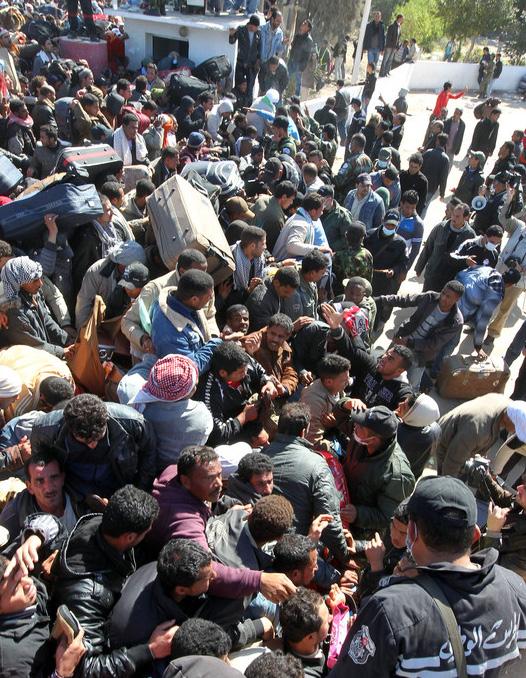
5 minute read
The seasons of a revolution

CorporateDispatchPro
The seasons of a revolution
The popular revolts that raged across the Arab region in 2011 were a turning point, but the direction of change varied from country to country. Dr Tonio Borg, Malta’s Foreign Affairs Minister at the time, reflects on the events in Tunisia, Egypt, and Libya from a Euro-Mediterranean perspective.
THE UNCONTROLLABLE SPREAD OF THE UPRISING
Many observers were surprised that the Arab Spring started in Tunisia, which had the more liberal policies in the region and maintained good relations with the EU. But the uprisings quickly spread to Egypt and Libya, where the environment was completely different.
Egypt, a vast country and the host of the Arab League headquarters, is widely considered a leader in the Arab world. Neighbours were particularly anxious about the Muslim Brotherhood swooping in to claim the void in power, as in fact happened for a while.
Libya – caught between Tunisia and Egypt – was the third theatre of the Arab Spring. Prime Minister Lawrence Gonzi and I had visited Libyan leader Muammar Gaddafi just some days before revolts eventually broke out in his country and the Colonel expressed disappointment that the EU did not back Ben Ali in Tunis sufficiently. Gaddafi argued that, for all their shortcomings, the Arab regimes fended off the proliferations of extremism.
FACTORS BEHIND THE REVOLTS
The three Arab states were ruled with an iron fist. The strongmen in each country effectively imposed dictatorships on their people with public assets controlled entirely by the state leaders and in Libya the loyalty of the armed forces directed towards the heads of state personally. In the weeks and months following the revolts, obscene


YOUR PURPOSE IS YOUR BIGGEST ASSET




CorporateDispatchPro
cases of systematic abuse endured by the populations under their rule started to emerge, revealing a dark side to the autocratic presidents.
However, the response of the trio of leavers was different. While Egypt’s and Tunisia’s presidents Hosni Mubarak and Ben Ali agreed to step aside and went into exile, Col. Gaddafi sought to crush the revolt. The tide quickly turned against the regime and he was chased out of Tripoli by the rebels and eventually killed in cold blood.
DIFFERENT PATHS SINCE THE REBELLIONS
In Tunisia, the uprising led to a transition from Ben Ali to a postrevolutionary government, in part thanks to the robust civil service already in place. This does not mean that everything went swimmingly, there were hiccups along the way and deep-rooted reform remains a works in progress.
The situation in Egypt took a different turn as a popular second revolution slid the country back to square one, except that there is now another president in charge. The killing of an Italian researcher in its territory in 2016, allegedly at the hands of the secret service, further dampened Cairo’s relations with the West.
Libya remains in a state of turmoil, ten years after the removal of Gaddafi. Infighting and violence has thrown the country into a bloody conflict and subsequent governments have failed to extend control over the whole national territory Meanwhile, the destabilisation in Libya exacerbated a migration emergency affecting southern EU states, especially Malta and Italy.
A MOVEMENT LED BY YOUNG PEOPLE
The Arab Spring was sparked by a lone 26-year-old protestor in Tunisia. Exasperated by an institutionalised and humiliating system of bribery by public officials, Mohammed Bouazizi set himself on fire outside the governor’s office. The uprising in Tunisia and the Arab region inspired people from all walks of life but young people were right at the forefront.
On a visit to Benghazi just after the Libyan revolt began, rebels showed me countless photos of young people who had died in


the conflict attempting to storm the Administrative Centre of the government. There were many young men and, equally, young women leading the charge against the Libyan regime.
MALTA IN THE PICTURE
Malta is the EU country closest to the region and, over the years, it had developed various business and investment interests with its Arab neighbours. There were also many Maltese people living and working in the territories, especially in Libya.
The uprisings presented the greatest foreign policy challenge to Malta since its Independence, and the government at the time struck a delicate balance by avoiding involvement in military missions but offering the country’s capabilities for humanitarian operations. In fact Malta became a base for evacuations as foreign governments started taking their citizens out of the region.
Three major operations were the decampment of the US Embassy in Tripoli, the relocation of Libyans trapped at the border with Tunisia, and the evacuation of hundreds of Chinese workers working in Benghazi.

CorporateDispatchPro
AN UNFINISHED PROJECT
The Arab Spring has not fulfilled its potential, but it was certainly not a failure and the events were an important stage in the region’s development. At the same time, however, countries in the West should be careful not to expect Arab countries to establish democracies in the mould of continental or Anglo-Saxon states. Arab nations have their own systems and longstanding cultures, and while the international community has a responsibility to keep its engagement with the countries, it must also respect the social course of action without prejudice or any condescending approach
. The revolutions have lifted the lid on structural problems in the region, but the next step is now for the countries to grow strong institutions that address inequalities and promote freedom and justice.
Tonio Borg is a former European Commissioner and a former Deputy Prime Minister and Minister of Foreign Affairs of Malta. He is resident senior lecturer in public law at the University of Malta. Tonio Borg LL.D. Ph. D. K.O.M.









